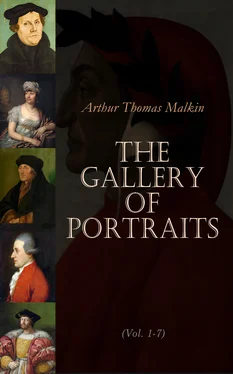At the restoration, Boyle was treated with great respect by the King; and was strongly pressed to enter the church by Lord Clarendon, who thought that his high birth, eminent learning, and exemplary character might be of material service to the revived establishment. After serious consideration he declined the proposal, upon two accounts, as he told Burnet; first, because he thought that while he performed no ecclesiastical duties, and received no pay, his testimony in favour of religion would carry more weight; secondly, because he felt no especial vocation to take holy orders, which he considered indispensable to the proper entering into that service.
From this time forwards, Boyle’s life is not much more than the history of his works. It passed in an even current of tranquil happiness, and diligent employment, little broken, except by illness, from which he was a great sufferer. At an early age, he was attacked by the stone, and continued through life subject to paroxysms of that dreadful disease: and in 1670, he was afflicted with a severe paralytic complaint, from which he fortunately recovered without sustaining any mental injury. On the incorporation of the Royal Society in 1663, he was named as one of the council, in the charter; and as he had been one of the original members, so through his life he continued to publish his shorter treatises in their Transactions. In 1662 he was appointed by the King, Governor of the Corporation for propagating the Gospel in New England. The diffusion of Christianity was a favourite subject of exertion with him through life. For the sole purpose of exerting a more effectual influence in introducing it into India, he became a Director of the East India Company; and, at his own expense, caused the Gospels and Acts to be translated into Malay, and five hundred copies to be printed and sent abroad. He also caused a translation of the Bible into Irish to be made and published, at an expense of £700; and bore great part of the expense of a similar undertaking in the Welsh language. To other works of the same sort he was a liberal contributor: and as in speech and writing he was a zealous, yet temperate advocate of religion, so he showed his sincerity by a ready extension of his ample funds to all objects which tended to promote the religious welfare of his fellow-creatures.
In the year 1666 he took up his abode in London, where he continued for the remainder of his life. We have little more to state of his personal history. He was elected President of the Royal Society in 1680, but declined that well-earned honour, as having, in his own words, “a great (and perhaps peculiar) tenderness in point of oaths.” In the course of 1688 he began to feel his strength decline, and set himself seriously to complete those of his undertakings which he judged most important, and to arrange such of his papers as required to be prepared for publication. It gives us rather a curious notion of the scientific morality of the day, to learn that he had been a great sufferer by the stealing of his papers. Such at least was his own belief, hinted in a public advertisement, and expressed more fully in his private communications. His manuscript books disappeared in an incomprehensible way, insomuch that he resolved to write upon loose sheets of paper, “that the ignorance of the coherence might keep men from thinking them worth stealing.” Notwithstanding he complains of numerous losses, and expresses a determination to secure the “remaining part of his writings, especially those that contain most matters of fact, by sending them maimed and unfinished, as they come to hand, to the press.” A still more serious loss occurred to him through the carelessness of a servant, who broke a bottle of vitriol over a box of manuscripts prepared for publication, by which a large part of them were utterly ruined. To these misfortunes, the non-appearance of many promised works, and the imperfect state of others, is to be ascribed. During the years 1689–90, he gradually withdrew himself more and more from his other employments, and from the claims of society, to devote himself entirely to the preparation of his papers. He died, unmarried, December 31, 1691, aged sixty-five years, and was buried in the chancel of St. Martin’s-in-the-fields.
To give merely the dates and titles of Boyle’s several publications, would occupy several pages. They are collected in five volumes folio, by Dr. Birch, and amount in number to ninety-seven. The philosophical works have been abridged in three volumes quarto by Dr. Shaw, who has prefixed to his edition a character of the author, and of his works. From 1660 to the end of his life, every year brought fresh evidence of his close application to science, and the versatility of his talents, and the extent of his knowledge. His attention was directed to chemistry, mathematics, mechanics, medicine, anatomy; but more especially to the former, in its many branches: and though he is not altogether free from the reproach of credulity, and appears not to have entirely freed himself from the delusions of the alchymists, still he did more towards overthrowing their mischievous doctrines, and establishing his favourite science on a firm foundation, than any man; and his indefatigable diligence in inquiry, and unquestioned honesty of relation, entitle him to a very high place among the fathers of modern chemistry. On this point we may quote the testimony of the celebrated Boerhaave, (Chemistry, vol. i. p. 55,) who says, that among the writers who have treated of Chemistry with a view to natural philosophy and medicine, we may reckon among the chief, the Hon. Robert Boyle. Redi also, in his ‘Experimenta Naturalia,’ affirms that in experimental philosophy there never was any man so distinguished, and that perhaps there never will be his equal in discovering natural causes.
It is, however, as the father of pneumatic philosophy that his scientific fame is most securely based. To the invention of the air-pump he possesses no claim, an instrument of that sort having been exhibited in 1654 by Otto Guericke of Magdeburg: but his improvements, and his well-combined and ingenious experiments first made that instrument of value, and proved the elasticity of the air. These were given to the world in his first published, and perhaps his most important work, entitled, ‘New Experiments upon the Spring of the Air.’
A considerable portion of Boyle’s works is occupied by religious treatises. Two of these, ‘Seraphic Love,’ and a ‘Free Discourse against Swearing,’ were written before he had reached the age of twenty; though not published for many years after. He established by his will an annual lecture, “in proof of the Christian religion against notorious infidels.” Bentley was the first preacher on this foundation.
Boyle’s funeral sermon was preached by Bishop Burnet, who had been under some obligation to him for assistance in publishing his History of the Reformation. The sermon has been considered one of Burnet’s best; and it has this advantage, that funeral panegyric has seldom been more sincerely and honestly bestowed. We conclude by quoting one or two passages, which illustrate the beauty of Boyle’s private character. “He had brought his mind to such a freedom that he was not apt to be imposed on; and his modesty was such that he did not dictate to others; but proposed his own sense with a due and decent distrust, and was ever very ready to hearken to what was suggested to him by others. When he differed from any, he expressed himself in so humble and obliging a way that he never treated things or persons with neglect, and I never heard that he offended any one person in his whole life by any part of his demeanour. For if at any time he saw cause to speak roundly to any, it was never in passion, or with any reproachful or indecent expressions. And as he was careful to give those who conversed with him no cause or colour for displeasure, he was yet more careful of those who were absent, never to speak ill of any, in which he was the exactest man I ever knew. If the discourse turned to be hard on any, he was presently silent; and if the subject was too long dwelt on, he would at last interpose, and, between reproof and raillery, divert it.
Читать дальше












